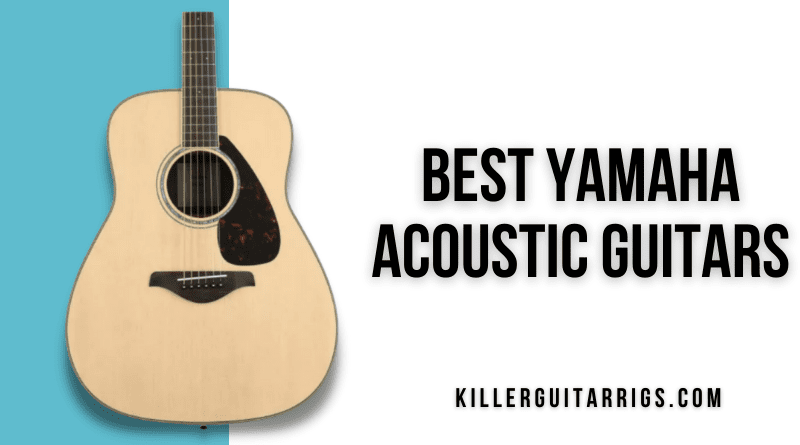Yamaha makes some of the best-selling acoustic guitars in the world, and yet they are the perennial underdog when it comes to brand presence in the marketplace.
In reality, this is no coincidence. Yamaha have been widely regarded for their superlative quality in musical instruments of all types for decades. For the most part, their design is unassuming and they don’t spend a lot of money on PR like Fender and Gibson. Instead, Yamaha quietly goes about letting the quality of their guitars speak for the brand.
In this KillerGuitarRigs Review, we check out the 7 Best Yamaha Acoustics on the market today. We’ve covered all price ranges, as well as a number of styles and sizes. When reviewing each model, we focused primarily on tone, build quality and overall playability.
Keep on reading to find out more about the 7 Best Yamaha Acoustic Guitars.
Read more about our review process.
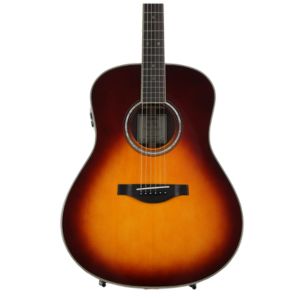
Yamaha LL-TA TransAcoustic
Features: All solid wood construction, Artificially aged top, Built in reverb & chorus
Benefits: Amazing depth of tone, Fantastic resonance, Vintage guitar sound
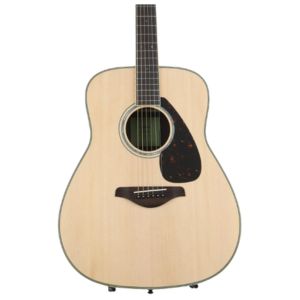
Yamaha FG830
Features: Solid spruce top, Rounded fretboard edges, Slim tapered neck
Benefits: Extremely comfortable, Big dreadnought tones, Excellent sustain
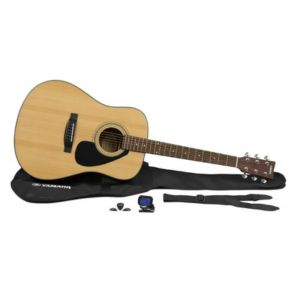
Yamaha GigMaker Standard
Features: Comes with gig bag and tuner, Bound body edges, Quality tuning machines
Benefits: Good tuning stability, Great volume, Exceptional durability
Contents
Our Top 3
Our Top Pick is the Yamaha FG830. This model is from their popular Folk Guitar series and is one of the world’s best-selling guitars. It offers an incredible blend of price and quality, and is one of the most affordable “working musician” acoustics on the market.
Budget-conscious shoppers should take a look at our Best Budget winner, the Yamaha Gigmaker Standard. It’s built to the same stringent standards as some of the more expensive models in the lineup, but it forgoes some of the frills to keep costs down.
If you’re looking for something extra special, consider our Editor’s Choice, the Yamaha LL-TA Transacoustic. It features a forward-thinking design with an incredible array of electronics, beautiful craftsmanship, and amazing tones.
Individual Reviews
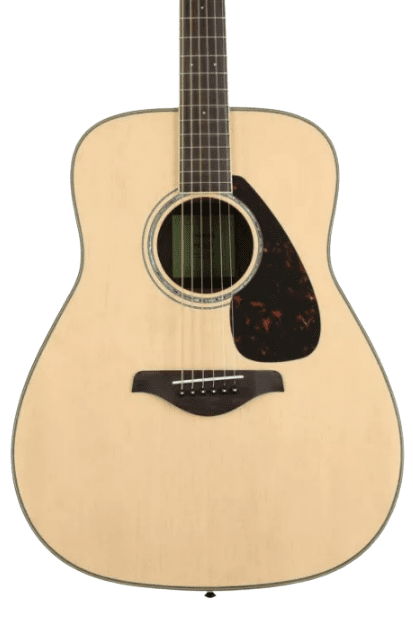
Yamaha FG830
Premium features and excellent build quality.
This is a wonderful guitar that has been built to a standard, not to a price. It comes with high end tone woods rarely seen on guitars in this price range. It offers great tones, and comes with quality hardware that works with guitarists, not against them.
The Yamaha FG830 had a classic dreadnought body shape and styling, with a handsome faux-tortoise pickguard, and even featured a nicely-bound body. The rosette had an eye-catching pearloid inlay, and looked absolutely fantastic (read our full FG830 review here).
It was made with a traditional wood selection, with layered rosewood on the back and sides, and a solid spruce top. The 1-piece top was light in color with an attractive grain.
The neck, like the back and sides, was made from nato. It had a nice, slim profile which we found to be both comfortable and responsive. The rosewood fretboard felt good under the fingers, and even came with rolled edges. We loved the quality of the fret finish, too. They were well-polished, had no sharp edges, and the crowns were nicely leveled.
After spending some time playing the FG830, we were blown away by the fantastic tones. The solid spruce top made it bright, with tons of punch in the mids, and some fantastic shimmer in the upper registers.
This is definitely a giggable and studio-ready guitar. It wasn’t well tuned out of the box, but after we made adjustments, tuning stability was rock solid. We played for several hours and didn’t find any need to adjust the pitch whatsoever.
Playability was another strong suit for the Yamaha FG830. The action was nice and low, making it extremely comfortable to play, while also helping to keep the intonation accurate.
Verdict: The Yamaha FG830 is a solid choice whether you’re a rank beginner, or a working musician on a tighter budget. It offers excellent comfort and playability, and the tones are unmatched in this price range, or frankly by any make or model. The construction quality is fantastic and we’re confident that any player would be happy with this guitar.
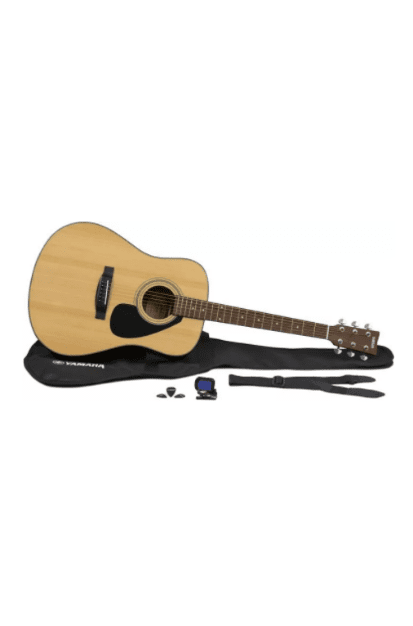
Yamaha Gigmaker Standard
An incredibly affordable starter guitar.
As far as budget guitars go, they don’t get much better. It’s as well made as any other Yamaha guitar, it comes with a range of accessories, and it absolutely represents some of the best value you’ll find anywhere on the market.
The Yamaha Gigmaker Standard might be basic, but it offers a ton of value in the form of great fit and finish, as well as surprisingly good tone and projection for a budget guitar (read our full review here).
The guitar itself that comes in the kit is a Yamaha F325, an entry-level, dreadnought-style acoustic. The use of laminate spruce on the guitar’s top makes it significantly more durable than a solid-top model. The back and sides were made with layered sapele, which is a mahogany substitute.
It had a comfortable nato neck, and because we didn’t find the gloss finish to be sticky, it was relatively fast playing, too. The manufacturer’s specs mention that the fretboard could be either walnut or laurel, our test model had walnut, which we thought looked nice, and performed well.
The frets weren’t quite as nicely polished as some of the more expensive models, but regardless, there were no sharp edges, and they were good and level, which is still a win considering the price.
During our tone test, we found that the F325 provided good volume and projection, and quite a dark, rich tone. Being laminated spruce, it wasn’t quite as tight at the top end, but still sounded great.
Yamaha really does excel when it comes to outfitting their guitars, even the low-cost models. The tuning machines turned well with no noticeable play, and they provided some of the best tuning stability we’ve ever seen in this price range.
We found that overall playability was good. To hold, it felt like any other dreadnought. Not exactly ergonomic, but definitely not uncomfortable. It had good action out of the box, too.
Verdict: The Yamaha Gigmaker is a gem of a guitar for the budget-conscious shopper. It’s the ideal beginner instrument, but also makes a great beach or camping guitar for the more seasoned player looking for something durable with good tone and a full voice.
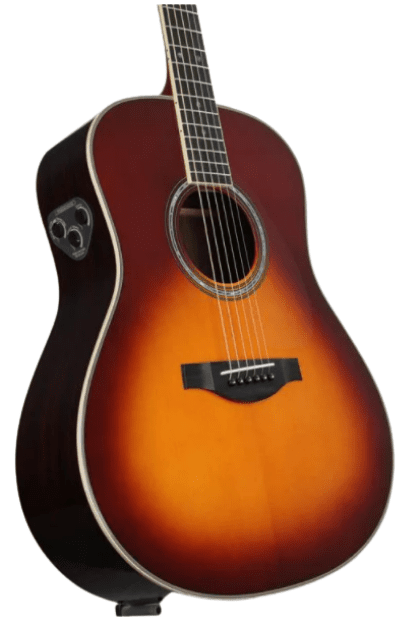
Yamaha LL-TA TransAcoustic Dreadnought
Premium features and excellent build quality.
If you’re looking for a pro level guitar that stands out a bit from the Martin/Taylor/Gibson crowd, it’s hard to go wrong with this Yamaha. It’s a premium model, using high end solid woods throughout, and offers one of the best pickup systems on any acoustic on the market.
The Yamaha LL-TA Transacoustic is a Yamaha L-style electric-acoustic with a body shape similar to the dreadnought (read our full review). Like most Yamaha models, ornate design elements are eschewed in favor of a clean, contemporary look. The rosette, for example, featured a gorgeous abalone inlay surrounded by plain tram track lines.
The soundboard was crafted using a solid Engelmann spruce top with a beautiful vintage tint, and the back and sides were made from solid rosewood. It had a 5-ply rosewood and mahogany neck, which felt great in the hand and was comfortable and responsive. Continuing the trend of premium wood choices, it was fitted with a stunning ebony fretboard.
We found the fretwork to be pretty much flawless. The edges blended seamlessly into the bound fretboard for a smooth feel and the crowns were polished to a mirror finish.
The spruce top had received Yamaha’s ARE (Acoustic Resonance Enhancement) treatment, which gave it a true, worn-in vintage tone right out of the box. It gave us exceptional clarity, no matter how we played it. Fingerstyle was nuanced and sweet, and heavy strumming was sharp and punchy.
Comfort and playability were also fantastic. The action out of the box was about as good as it gets. There was no need for adjustment or setup on our part and tuning stability was fantastic.
It featured built-in chorus and reverb effects that didn’t even require amplification for use. The System 70 pickup system did a great job of amplifying the natural character of the guitar when it was time to plug in, and didn’t color or cloud the tones.
Verdict: The Yamaha LL-TA Transacoustic is a genuine alternative for players looking at the high-end Mexican-made Martin or Taylor lineup. It boasts exceptional build quality, with beautiful woods and quality hardware used throughout, and the inclusion of the Transacoustic electronics really sets it apart. It even came with a high-quality, well-padded gig bag.
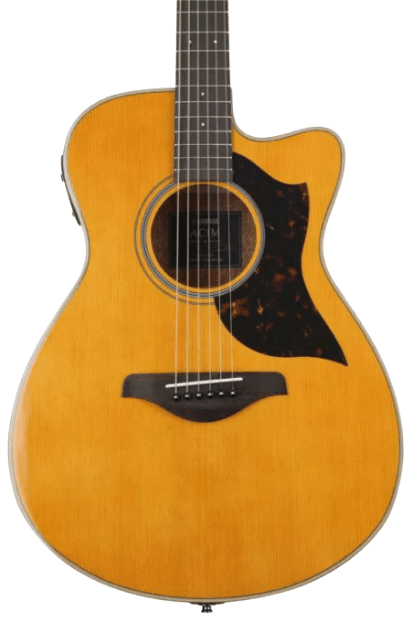
Yamaha AC1M
A handsome and well made concert acoustic with sweet tones.
This is an understated option that is perfect for the working musician on a budget. Like all Yamaha guitars, it’s well made using quality materials and components, and the concert body style provides great comfort and playability without sacrificing tone.
The Yamaha AC1M is described as having a vintage natural finish, although we’d say it had a bit too much tint to be referred to as natural. Despite the description, we really did love how it looked.
The top was made with solid Sitka spruce, which is a staple material in the acoustic world. At the back and sides, layered mahogany was the wood of choice. It gave the guitar a very traditional look. As we know, layered and laminate woods are significantly more durable and have little effect on tone overall. Good news if you plan to gig this guitar.
It was made with a 3-piece mahogany neck with a slim C type profile. We found it to be comfortable and fast, and paired with the genuine rosewood fretboard, it was an overall great-playing neck. The fretwork was good, with no sharp edges or sprouting.
We found it to have a nice tonal balance, although it was punchiest around the top end. The smaller body made it sweet-sounding, particularly with gentler strumming and fingerstyle play. It didn’t have the volume and projection of the L shape and dreadnought models it went up against in this test, but thanks to the System 66 electronics with onboard EQ and piezo pickup, it can be easily amplified.
This AC1M offered great playability. It had a nice low action and the hardware was all excellent quality, which in turn provided great overall reliability and tuning stability.
Verdict: The Yamaha AC1M is a fantastic choice for players of all abilities looking for a quality guitar without breaking the bank. It’s not budget-priced, but it is still extremely affordable considering everything you get. It’s comfortable, it sounds great, and is a true all-rounder that can perform with any style of music.
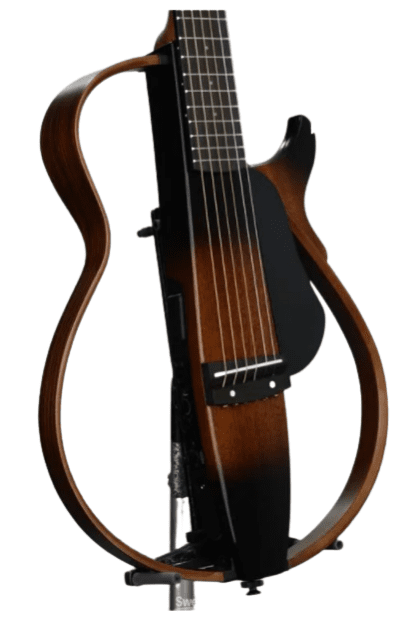
Yamaha SLG200S Silent Guitar
Unique looks and fantastic performance.
Without a doubt, this is one of the most unique acoustic guitars on the market. It’s lightweight, offers feedback free performance when amplified, and allows for truly silent practice, something those who live with others will absolutely appreciate.
If you’re looking for a statement guitar, the Yamaha SLG200S Silent Guitar will absolutely fit the bill. The body shape would probably be best described as electric Spanish, in silhouette alone if nothing else. The body and neck are both made from mahogany. Despite the fact that there was no top and no back, we found it to be very sturdily built.
The neck was topped off with a lovely rosewood fretboard. The fretwork was also solid, with nice smooth edges and a decent polish on the crowns.
It was equipped with an SRT pickup system with onboard EQ, and also featured an under-saddle piezo. This let us blend more natural-sounding acoustic tones with the powered pickup to create some really nice tonal textures.
The design of the guitar, combined with these electronics, did an amazing job of keeping tones tight when amplified. We experienced absolutely no feedback from either the piezo or the active pickup. If you’ve played an electric-acoustic through a loud amp before, you’ll know that’s quite rare!
The action was a little higher than we’re used to from Yamaha guitars. The playability didn’t detract from the overall build quality, however, which was absolutely superb. Tuning stability was as strong as it gets, and the tuning machines themselves worked well, giving positive engagement with every turn.
Another unique feature of this guitar is that it can break down to fit into the compact gig bag it comes with. This means it can actually fit into the overhead bin of an airplane. Great news for those who like to travel with their guitars.
Verdict: The Yamaha SLG200S Silent Guitar is without a doubt one of the most unusual-looking guitars on the market. It offers a very specific range of features for a relatively niche group of players, but if you happen to fall into one of those groups, you might find yourself in love with the wonderful amplified tones, the extreme portability, or simply having the option to practice quietly.
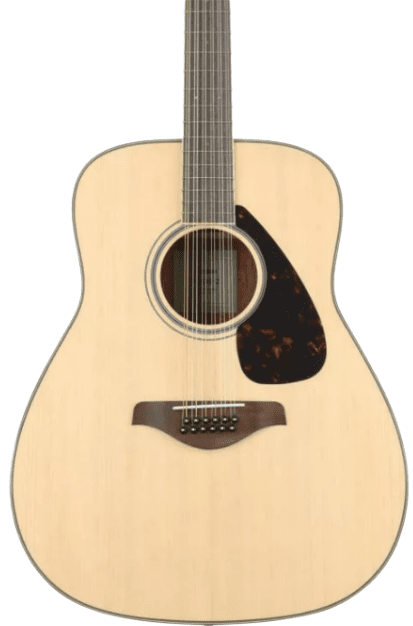
Yamaha FG820
All the jingle jangle you’ll ever need.
If you’re looking to get into a quality 12 string without breaking the bank, this Yamaha comes highly recommended. It’s built with the same care and attention as any other Yamaha, it offers fantastically bright tones, and is effortlessly playable.
The Yamaha FG820 is based on the same platform as the venerable FG800 dreadnought that we love so much here at KGR. It’s a full-size guitar with all the presence of a dreadnought and the added shimmer that you can only find from a 12-string.
Like the FG800, it’s made with a solid spruce top. It came in a natural finish, which we thought looked really good. The top was finished off with a nice faux-tortoise pickguard, and some simple but attractive binding.
The back and sides were crafted from layered mahogany, so nothing unusual there. We found that the combination of the spruce and mahogany worked really well with this 12-string. It had a nato neck, which was understandably thicker than the neck on its 6-string sister models, but it was still comfortable.
The fretboard was finished in luxurious rosewood. It had a deep, dark color, not too far from ebony, so it looked fantastic and it played beautifully. The fret finish was on par with our Top Pick, the FG830, with smooth edges and good leveling, although the crowns weren’t as polished as they could have been.
We really enjoyed the time we spent playing this guitar, so much so that we highlighted it in our roundup of The Best 12-String Guitars Under $1000. The tones were big and bold, but never came across brash. The solid Sitka spruce top made it super lively and the “jangle” was really sharp.
It did take some time for tuning stability to settle with this model. It was most likely due to the additional tension on the neck that comes with having 6 extra strings. Once they were stretched, they performed well and there were no further issues with tuning.
Verdict: The Yamaha FG820 is a stellar choice for guitarists of all abilities who are looking to move into the 12-string space. It offers excellent value for your money, and the same construction quality and great tones you’d find in any other F-series guitar. It makes use of solid-tone woods and the hardware is unmatched at this price point.
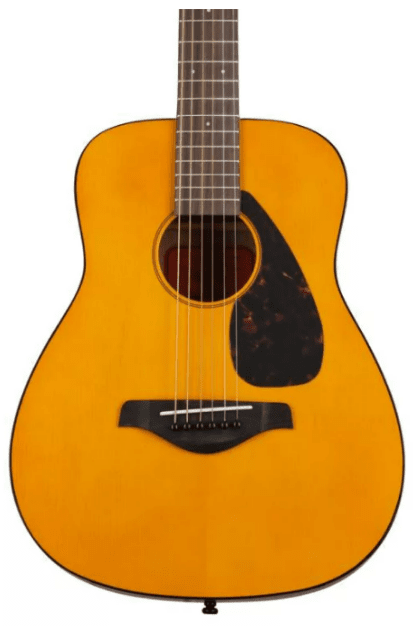
Yamaha JR1
Yamaha quality for the youngest strummers.
So many guitars aimed at kids are little more than toys, but this model is a genuine musical instrument. It’s built to the same standard that Yamaha is renowned for, and not only is it well made, but it sounds great, too.
The Yamaha JR1 is a ¾ size model, so of course it’s a great fit for the younger guitarist. It had a spruce top with meranti back and sides. Meranti is a mahogany substitute, which works perfectly well for this reduced-size model.
Like its big brothers in the FG series, it had a nato neck. It was ultra slim, and we found it to be fast-playing and very comfortable. Young players and adults with smaller hands will really appreciate this neck profile. It had a nice rosewood fretboard, which is truly rare at this price point, and the frets didn’t have any sharp edges at all.
Tonally, it had a really nice balance. The spruce top ensured that it had plenty of punch with some nice shimmer in the treble range. The additional weight from the meranti also helped to improve sustain, something that’s often a challenge for reduced scale instruments.
The slim neck really helped the playability, although the action benefits from being lowered a bit. This is a relatively simple task, however, and after that adjustment, there were no other faults we were able to pick with this guitar.
Tuning stability was good and strong, and the vintage Kluson-style tuners not only looked great, but performed well, offering just the right amount of resistance when being turned.
Verdict: The Yamaha JR1 is one of the most underrated short-scale guitars on the market. It’s a rare gem insomuch as it’s built to the same standards as the full-size models in the lineup. In addition to the excellent build quality, it offers a nice, rich tone and has surprising presence for a ¾ size guitar.
How To Choose The Right Guitar For You
Are Yamaha Guitars Made in Japan?
Like many manufacturers, Yamaha runs multiple manufacturing operations across several countries, including Japan. As with brands like Martin and Taylor, however, Yamaha reserves domestic production for their high-end models, with the rest being mostly built in China.
There is an easy way to spot a Japanese-made Yamaha. If it features a 26 or 36 in the model name, it’s a Japanese model. Anything else will be made overseas.
Are Yamaha Guitars Good Quality?
Yamaha makes some of the best acoustic guitars on the market. While this is often subjective, just reading the spec sheets on similarly-priced models from Yamaha vs. Taylor or Martin, or even Gibson will tell you all you need to know. Even with their entry-level models, Yamaha uses solid tone woods, they use high quality hardware, and their QA process is amongst the best of any brand in the world, even in their foreign factories.
Are Yamaha Guitars Expensive?
If you’ve been wondering whether Yamaha guitars are expensive, you’ll be pleased to know they have instruments to suit literally any budget. Their entry-level models are found for less than $200 and their high-end premium models command upwards of $18,000.
What is the Difference Between Yamaha’s Budget Models and their Premium Guitars?
While Yamaha’s budget models do offer a lot of value, there’s still a significant gulf between them and their premium models. Here are some examples of the factors that separate the high-end guitars from the entry-level models:
Type of Top
Layered, or laminate woods, are the cheapest of the construction materials used by Yamaha. They are made by compressing together many thin layers of spruce or other woods, resulting in a top that has similar tonal properties, but without the nuances and delicate under and overtones found in solid woods.
Not all solid woods are created equal, in fact not even all spruce species are created equal. In some of Yamaha’s entry-level models, the FG800 or FG830 for example, you’ll see them listed as having a solid spruce top. This is a great tone wood with bright, springy tones, but it doesn’t have the most aesthetically-pleasing grain.
Sitka Spruce is another great option that is common on intermediate and above guitars like the AC1M. It has a tighter grain pattern than the cheaper spruce, enhancing both its looks and its stiffness. Because it’s stiffer, it projects better than the lower-end spruce, for a louder, fuller tone.
Engelmann Spruce is a premium wood that is usually reserved for high-end guitars. It’s lighter than Sitka spruce and less stiff. The improved flexibility does result in reduced projection, but it increases the top’s ability to vibrate, which creates a richer sound and fuller overtones. It’s less widely available than cheaper spruces, which means Yamaha reserves it for premium models like the LL-TA Transacoustic.
Back and Sides
While the back and sides have less overall impact on tone than the top, having 100% solid tonewood used in your guitar gives it a sound and feel like no other.
Yamaha’s student-grade and entry-level models are made with “locally-sourced tone wood,” which is their way of saying they will use whatever they have available. This means that consistency between guitars isn’t always guaranteed.
On their high-end models, Yamaha uses woods like mahogany, and even solid rosewood for the back and sides. The use of these woods adds unmistakable depth and character to the tone.
Strings
Yamaha’s more expensive models tend to come loaded with Elixir Nanoweb strings, which are some of our favorite coated strings. They sound and feel great, and make a big difference to the playing experience.
Lower-end models ship from the factory with generic unbranded strings. Of course, these can easily be swapped out for the same Nanowebs found on the premium guitars, but that requires additional purchases and effort.
Final Thoughts
We really do love getting to showcase Yamaha Guitars. So often people gravitate towards the big American names, and while those companies make great guitars, opting for a Yamaha will in many cases get you a superior guitar for less money.
To summarize our findings, we’d recommend the Yamaha FG830 for anybody looking for a great balance of price and performance. If budget is your biggest concern, take a look at the Yamaha Gigmaker Standard. If you’re planning to splash out on a special guitar, you’ll definitely want to consider the Yamaha LL-TA Transacoustic.
Check out these other articles you might like:

